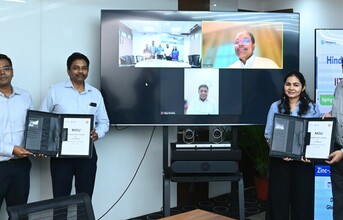
In a landmark move supporting the ongoing global energy transition, Hindustan Zinc Limited, India's largest and the world's second-largest integrated zinc producer, has signed a Memorandum of Understanding (MoU) with the Indian Institute of Technology Madras (IIT Madras). This strategic collaboration aims to develop a groundbreaking 1 kWh electrically rechargeable Zinc-Air battery prototype, reaffirming both institutions' commitment to advancing the future of sustainable energy solutions.
This partnership marks a significant step forward in the evolution of zinc-based battery technologies, leveraging zinc's abundant resource availability, cost-effectiveness, and established safety record. While lithium-ion batteries currently dominate the market, their high cost, limited resource availability, and safety concerns present major challenges that zinc-based alternatives can effectively address.
Speaking about the collaboration, Arun Misra, CEO of Hindustan Zinc Limited, said, "Zinc, a critical metal across numerous industries, is set to play a crucial role in the global energy transition. Our metal offers a sustainable and economically viable alternative to lithium in energy storage technology. Our partnership with IIT Madras will advance research on zinc-air battery technology, which will redefine the future of energy storage. By exploring new applications of zinc in energy storage, we are committed to contributing to a greener and more sustainable future for generations to come."
Leading the research team from IIT Madras, Prof Aravind Kumar Chandiran, Head of the Hyundai Hydrogen Innovation Hub at IIT Madras, brings extensive expertise in energy storage solutions, including solar cells and zinc-air batteries. His research team has already developed a prototype rechargeable Zinc-Air battery and holds three Indian patents for innovations in leak resistance, anode recharging, and anode replacement design. This collaboration aims to enhance energy storage systems, with potential applications in renewable energy, data centres, and telecommunications.
Highlighting the expected outcomes, Prof Aravind Kumar Chandiran, who is also a faculty member in the Department of Chemical Engineering at IIT Madras, said, "Our partnership with Hindustan Zinc allows us to leverage our expertise in zinc-air battery research and their industry leadership in metals to develop innovative solutions that serve as significant energy storage systems for electric vehicles and stationary storage systems. The successful development of this prototype will accelerate India's capabilities in advanced battery technologies and pave the way for further innovations in the field."
Zinc-Air batteries are emerging as a viable alternative, known for their long-duration storage capabilities, durability, and potential to be a more affordable alternative to lithium-ion batteries. Compared to lithium, which is over four times more expensive, zinc offers a more affordable solution with superior performance attributes.
This battery technology is much more stable than lithium-ion chemistry and safe for vehicles, as it utilises water-based electrolytes and no flammables. Zinc-Air batteries offer a longer life cycle and operate at low power with higher energy efficiency compared to lithium-ion batteries. In terms of performance, Zinc-Air batteries are superior to lithium-ion, making them an ideal choice for two and three-wheelers. Globally, zinc-based batteries have proven dependable and successful in the high-end defence sector (including aerospace and marine), renewable energy, and critical infrastructure for data centres and 5G telecommunications.
Earlier research in zinc-air battery technology by IIT Madras has yielded remarkable results, addressing the shortcomings of lithium-ion batteries currently on the market. Unlike the need to replace entire battery packs in lithium-ion systems, used zinc battery cassette packs can be removed and replaced with fully charged ones, adding rechargeability to the list of advantages. Zinc-Air batteries represent a tremendous leap in the energy storage sector, being both green and economical.
This MoU with IIT Madras complements Hindustan Zinc's ongoing efforts in the battery storage space. Recently, the company signed an MoU with Jawaharlal Nehru Centre for Advanced Scientific Research (JNCASR) to develop next-generation zinc-ion batteries. Prior to that, Hindustan Zinc partnered with AEsir Technologies, Inc., a US-based company specialising in next-generation nickel-zinc battery technologies.


























